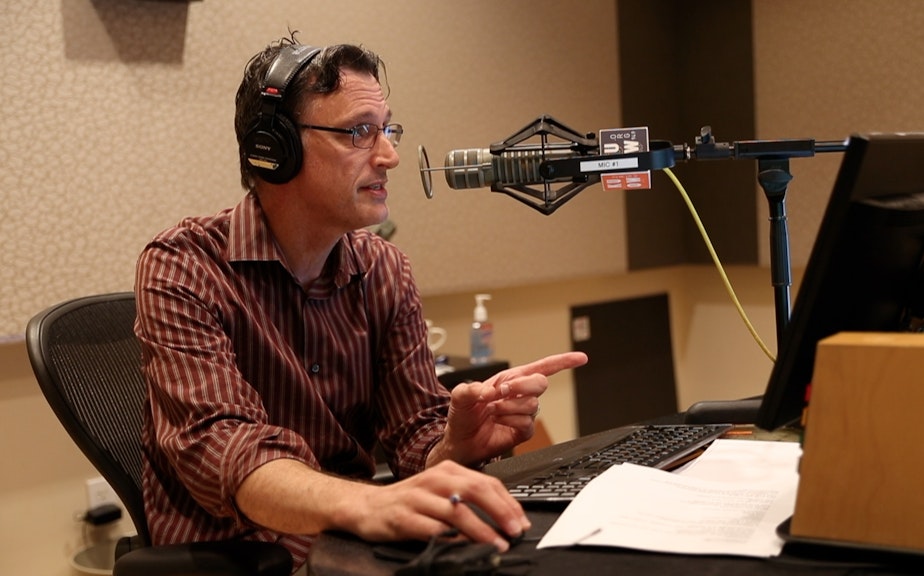Bill Radke: 'I have some big regrets about that interview'

This week, we chose to air an interview I did with a man who got punched unconscious in downtown Seattle, while wearing a swastika armband.
He said he's not a Nazi. Many of you told me if you wear a swastika, you’re a Nazi. We’ll discuss that in a moment.
I have some big regrets about that interview. I added to the pain and the fear in this country, this city.
People I know and respect, people I love, have told me they feel hurt, disgusted, betrayed, scared and angry.
That hurts. I'm sorry for causing that pain.
Sponsored
But it's more than that – it's not just "I'm sorry if you were offended." I made some careless, callous decisions. That hurts too, and it's not acceptable.
I want to tell you why I did it, how I failed and what you can expect from KUOW.
First of all, why I did it. Here's the first sentence of our mission statement: “The mission of KUOW is to create and serve an informed public, one challenged and invigorated by an understanding and appreciation of events, ideas and cultures.” I failed at that and I apologize.
My intent was that you would get a better appreciation of what you were already hearing about this man if you heard from him directly. KUOW believes in allowing everyone to speak, even people with offensive views, because democracy works best when we speak freely and listen.
Sponsored
NPR's position on this is simple: “We cover the world as it is, not as we wish it were.”
I still believe that. And we're still committed to challenging you, presenting ideas you may not agree with. But the interview failed to create an informed public – the man didn't express Nazi ideology. But he may well be a liar who pretends to be moderate so he can recruit moderate conservatives to the Nazi cause. I interviewed a history professor yesterday who thinks that's exactly what he wanted, and that I helped him.
This interview also prompted a debate — within this show and across the station – about when we should grant anonymity. KUOW’s ethics guidelines are to grant it only if we verify the person is who they say they are; and we have a compelling reason for anonymity.
We verified he was the man who got punched. And when he told us he worried for his safety, we took that as a compelling reason to hide his name. But of course, that didn't compel us to air it. Not airing it at all would have been better than the way we did it. It aired by itself, without immediate balance or context.
The final part of the mission statement I read you was that we will help you be challenged and invigorated by an understanding of ideas. Here’s where I feel the worst of all.
Sponsored
I’m human, I have my biases and my blind spots and my comfort zones. I have this blanket idea that more speech is good. I don’t believe everything my guests say. I have this idea that everyone can be as skeptical as I am, and over time, truth will outshine everything, because you feel it when you hear it. That’s why I do this job.
I try so hard to understand and connect with the person sitting across from me, because I want us all to learn and to feel each other’s humanity. Again, that did not happen with this interview.
Finally, I want to talk about what I believe, which I really don’t like to do on the air.
I’ve had one radio job where I was supposed to be an opinionator. I was bad at it. My heart wasn't in it – there are so many people we could be listening to besides me. I’ve always held to the idea of journalistic neutrality. I’ve held on to that, even as people have been oppressed and victimized all around me. I know it, I’ve seen it my whole life.
And this year is different. You can feel that. So I want to tell you that I cherish the humanity inside every one of us. Our humanity is precious and it’s vulnerable. And even journalists have a responsibility to guard it. I knew that, but I let my duty slip this week.
Sponsored
I’m sorry for that. You should expect better from KUOW.
I promise to do better.
Listen to the rest of the conversation about this interview on Week in Review.
For reference, this is the audio from the original interview:

